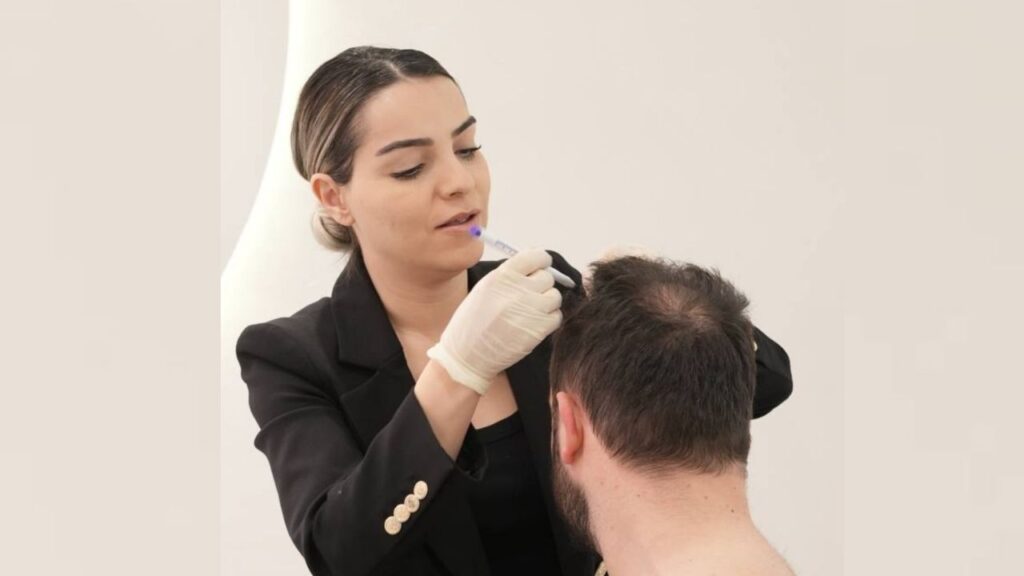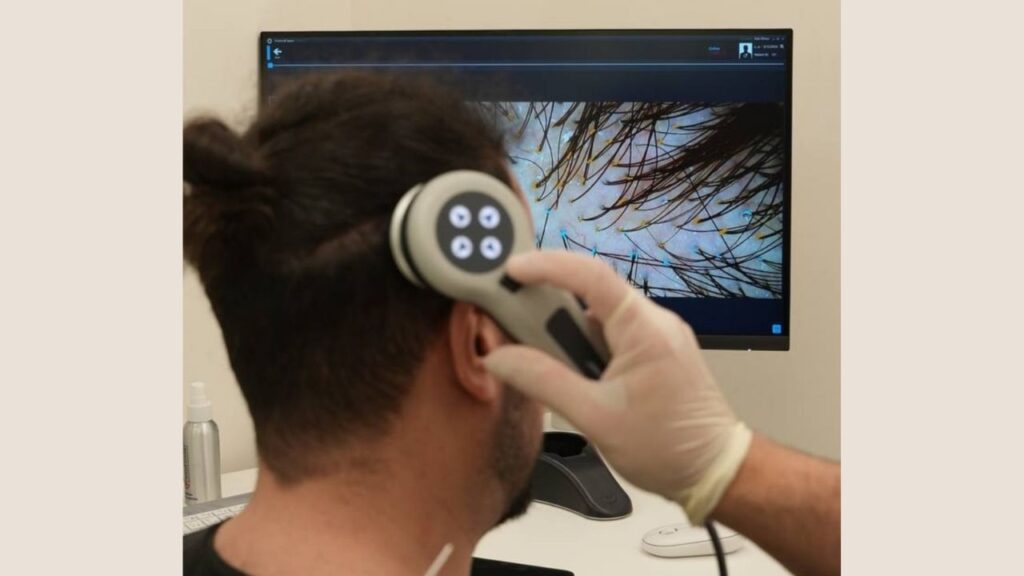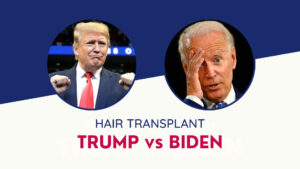A common medical condition called diabetes can significantly affect the results of cosmetic surgery, including hair transplants. This connection results from diabetes’s effects on blood circulation, which weaken hair follicles and cause hair loss, particularly in the scalp. Given the increasing number of diabetic patients seeking hair transplant solutions, it is critical to comprehend the relationship between diabetes and hair transplant procedures, including safety concerns such as “Is hair transplant safe for diabetics?“
To distinguish between “hair transplant for diabetes type 1” and “hair transplant for type 2 diabetes,” this article will address the conditions for hair transplantation for people with diabetes. It will address commonly asked questions such as “does hair grow in hair transplant diabetes?” in addition to examining the risks and precautions that people with diabetes undergoing this procedure must take and how diabetes affects hair growth following transplant. Hair transplantation can benefit diabetic patients, provided specific conditions are met. Real-life success stories can inspire and counsel prospective candidates.

Understanding Diabetes and Its Impact on Hair Loss
Comprehending the complex relationship between diabetes and hair loss reveals many physiological factors that interact in a complex way and can have a substantial effect on those with this condition.
- Blood Vessel Damage and Circulation: One of the main symptoms of diabetes is high blood sugar, which can harm blood vessels all over the body. This includes the intricate web of blood vessels that provide the hair follicles with oxygen and nutrients through blood. Damaged vessels can cause poor circulation, starve hair follicles, and impede their growth, ultimately resulting in hair loss. Impact on Hair Follicles: By restricting the supply of nutrients and oxygen required for normal hair growth, the decreased blood flow directly impacts the hair follicles. Thicker skin may eventually result from this and smaller, weaker hair follicles.
- Hair Growth Cycle Disturbance: Elevated blood sugar levels can cause a disturbance in the typical hair follicle growth cycle, resulting in feeble and brittle hair. This disturbance can lead to decreased density and thinning hair, a common worry for people with diabetes.
- Hormonal Imbalances and Inflammation: Diabetes can cause hormonal imbalances and inflammation, further complicating hair growth.Insulin Resistance and Androgen Levels: High androgen levels can result from insulin resistance, frequently observed in diabetes. Due to these elevated levels, hair follicles may shrink, which could lead to hair loss.
- Inflammation: Elevated blood glucose levels can cause inflammation, affecting a hair follicle’s regular growth cycle. Because of the inflammation, the follicles may become smaller and find it more difficult to produce hair.
- Lifestyle and Self-Care Tips: Managing diabetes and mitigating its impact on hair loss involves a comprehensive approach to lifestyle and self-care. Nutrition and Hydration: It is important to include essential nutrients in your diet and to drink plenty of water. These actions promote general health, including hair health, and help keep blood glucose levels at ideal.
- Exercise and stress management: Regular exercise can lower blood sugar levels and reduce stress, preventing or significantly slowing down the hair loss associated with diabetes. Using different coping mechanisms for stress can also lessen hair loss.
- Supplements and Medications: Certain people may benefit from over-the-counter remedies like Minoxidil (Rogaine) or prescription drugs like Finasteride (Propecia). Folic acid, vitamin A, and biotin supplements can also promote hair health. However, speaking with a medical expert before beginning any new treatment is crucial.
A proactive approach to management and understanding these factors can help individuals with diabetes better deal with the challenges associated with hair loss.

Assessing Eligibility for Hair Transplant in Diabetic Patients
To make sure they are good candidates, diabetics thinking about getting a hair transplant must go through a comprehensive pre-operative evaluation. This evaluation consists of several important steps:
- Informing the Surgeon about Diabetes Diagnosis Patients must tell the cosmetic surgeon if they have diabetes.
- It is important to have a thorough conversation about managing diabetes and any complications.
- Pre-Operative Testing Comprehensive testing is necessary, including blood sugar monitoring and hormone testing.
- It is advised to review long-term glucose control with a HbA1c test.
- Blood sugar management is necessary to have well-controlled blood sugar levels before the procedure.
- Patients should manage their stress, eat a balanced diet, exercise frequently, and get enough sleep.
- Quitting smoking at least two weeks before the operation is advised.
Eligibility Criteria for Diabetic Patients:
- Type 2 diabetes patients are usually regarded as appropriate if their diabetes is adequately controlled.
- Needs to regulate blood pressure and sugar levels, either with or without prescription drugs.
- Type 1 diabetes patients may encounter additional difficulties due to erratic blood sugar levels.
- If you are insulin-dependent or need insulin in addition to other medications, it is not advised.
Selecting the Right Surgeon and Clinic:
- Experience with Diabetic Patients: Seek a surgeon with a reputable background in working with diabetic individuals.
- Patient testimonials, before-and-after photos, and accreditations should show the clinic has experience treating diabetic patients.
- Customized Care Plans: A comprehensive consultation process is essential to creating a customized treatment plan.
- The clinic should provide complete medical team coverage, transparent pricing, and top-notch equipment.
- Realistic Expectations: The healthcare provider must be truthful when setting reasonable expectations and results.
- Following a comprehensive evaluation, the surgeon will determine which hair transplant procedure is most appropriate for the patient based on their overall health and diabetes status.
In conclusion, patients with well-managed diabetes who pass a thorough pre-operative evaluation are eligible for hair transplants. Choosing a surgeon and clinic specializing in diabetes care is crucial to reducing risks and guaranteeing positive results.

Hair Transplant Procedures Suitable for Diabetics
For diabetic patients suffering from hair loss, hair transplantation is a ray of hope because it promises to restore confidence and provides a long-term fix with natural results. Choosing an appropriate technique is the first step in hair transplantation, and diabetic patients must reduce potential risks. Compared to the Follicular Unit Transplantation (FUT) method, the Follicular Unit Extraction (FUE) method has a lower risk of complications, making it a preferred option for patients with diabetes among the available techniques.
Hair Transplant Methods for Diabetics
- Follicular Unit Extraction (FUE): Reduced Complication Risk: FUE is linked to a much lower risk of complications than FUT, which makes it a safer choice for patients with diabetes.
- The process entails removing individual hair follicles from the donor region and transplanting them to the recipient region. This technique shortens recovery time and minimizes scarring.
- Follicular Unit Transplantation (FUT): This process involves taking a strip of skin off the donor region to extract and transplant hair follicles.
- Patients with diabetes should be aware that the more invasive nature of FUT may increase their risk of complications like infection or delayed healing.
Considerations for Type 1 and Type 2 Diabetes Patients
- Type 1 diabetes: Patients with this condition may need insulin injections to maintain blood glucose levels during surgery, emphasizing the importance of a carefully thought-out procedure.
- Type 2 diabetes: The FUE method is recommended for managing moderate to severe hair loss. Its minimally invasive approach aligns well to minimize risk while achieving desired outcomes.
In essence, the choice of hair transplant method for diabetic patients hinges on a careful evaluation of the individual’s health status, the severity of hair loss, and the specific type of diabetes. The FUE method, with its lower risk profile and adaptability to the unique needs of diabetic patients, emerges as a highly suitable option. This personalized approach to hair transplantation ensures safety and maximizes the likelihood of successful, natural-looking results.
Risks and Precautions for Diabetic Patients Undergoing Hair Transplant
Patients with diabetes who are thinking about getting a hair transplant face particular difficulties and dangers, so careful preparation and thought are necessary to guarantee a good result. Important hazards consist of:
- Delays in Wound Healing: Patients with diabetes may experience delayed wound healing because of reduced blood flow and possible neuropathy. This slower healing rate increases the chance of a drawn-out recuperation following the hair transplant procedure.
- Infections: Patients with diabetes are more vulnerable to infections at the transplant site because high blood sugar can impair the immune system’s ability to fight off infections.
- Blood Glucose Fluctuations: Hormonal changes combined with stress during surgery can cause blood sugar levels to fluctuate, necessitating careful monitoring.
- Decreased Graft Survival: Poor blood circulation and the compromised immune system in diabetic individuals may affect the survival rate of the transplanted hair follicles, potentially impacting the overall success of the hair transplant.
Diabetes patients should take the following safety measures to reduce these risks and guarantee the effectiveness and safety of the hair transplant:
Pre-Transplant Precautions:
- Comprehensive Health Evaluation: Evaluate general health, considering age, blood sugar, and weight.
- Assess scalp blood flow to make sure the recently transplanted follicles survive.
- Before the procedure, manage your blood sugar levels to reduce the chance of complications.
- Selecting the Right Clinic: Seek out clinics that have dealt with diabetic patients.
- Check for certifications, accreditations, and the availability of top-notch machinery.
- To create a personalized treatment plan, ensure a comprehensive consultation process.
Post-Transplant Care:
- Blood Sugar Management: Maintain optimal blood sugar control through diet, medication, and monitoring to support healing and reduce the risk of infection.
- Wound Care: Follow the surgeon’s instructions for caring for the transplant site to promote healing and reduce the risk of complications.
- Regular Follow-ups: Attend scheduled follow-up appointments to monitor the healing process and address any concerns promptly.
People with diabetes can manage the risks of hair transplantation by choosing a qualified and experienced surgeon, following pre-and post-operative instructions, and keeping their blood sugar under control. This strategy increases the likelihood of a favorable result and guarantees the patient’s safety and well-being.
Post-Transplant Care for Diabetic Patients
Post-operative care is essential for diabetic patients who have had hair transplants to guarantee a speedy recovery and the best possible outcomes. To help with this process are the following guidelines:
Immediate Post-Transplant Care
- Blood Sugar Management: To keep blood glucose levels within the desired range, check them frequently.
- Follow the directions on the diabetes medication exactly.
- Wound Care: Maintain the transplanted area dry and clean.
- Wash your hair gently and with a mild shampoo to prevent grafts from coming loose.
- Refrain from massaging or scratching the scalp.
- Lifestyle Adjustments: Give up smoking at least two weeks before the procedure and keep abstaining afterward to promote faster wound healing.
- Keep your scalp out of direct sunlight for at least two weeks, and drink plenty of water.
Long-Term Care and Monitoring
- Diet and Exercise: A well-balanced diet high in vitamins and minerals aids in healing and hair growth.
- Regularly perform moderate physical activity to enhance blood circulation and regulate blood glucose levels.
- Stress and sleep: Use stress-reduction strategies like yoga or meditation.
- Ensure you get enough sleep to aid in healing and control blood sugar.
Follow-Up and Consultation
- Regular Check-ups: Keep your surgeon’s scheduled follow-up appointments to track graft survival and healing.
- To make necessary adjustments to diabetes management plans, speak with a diabetes specialist.
- Scalp and Hair Care: Keep caring for your scalp gently to avoid infection.
- Frequent washing aids in the healing process and helps remove crusting around the grafts.
Patients with diabetes who follow these post-transplant care instructions can speed up their recovery and increase the likelihood that their hair transplant will succeed. It is critical to keep lines of communication open with medical professionals and heed their customized recommendations for your unique medical needs.
Real-life Success Stories
An effective hair transplant can improve a diabetic patient’s self-esteem and appearance. Numerous advantages stem from this revolutionary process, especially for individuals with diabetes-related hair loss. The main benefits are as follows:
- Boosted Self-Esteem: The restoration of hair can profoundly impact an individual’s self-image and confidence, allowing them to feel more comfortable and positive about their appearance.
- Long-Term Solution: Unlike temporary solutions that may require ongoing management, hair transplants provide a long-lasting answer to hair loss, reducing the need for continuous treatment and care.
- Personalized Approach: Each hair transplant procedure is tailored to the patient’s specific needs and circumstances, ensuring that the approach and outcome align with their expectations and health requirements.
- Minimally Invasive Techniques: Modern hair transplant methods, such as Follicular Unit Extraction (FUE), are less invasive, involve minimal discomfort, and have quicker recovery times, making them suitable for diabetic patients.
- Natural-Looking Results: Advances in hair transplant technology ensure that results look natural and seamless, blending perfectly with the patient’s existing hair.
- Minimal Disruption to Diabetes Management: Careful planning and post-operative care mean that the hair transplant process can be integrated into the patient’s diabetes management plan with minimal disruption.
It is important for diabetic patients thinking about getting a hair transplant to comprehend these advantages. It is about growing back hair and gaining confidence, reaping long-term advantages, and having little to no effect on managing diabetes. Natural-looking results are achieved with this customized, minimally invasive method, guaranteeing that patients feel better about themselves and their appearance.
In summary
After conducting this thorough investigation, it is clear that although diabetes presents unique difficulties in hair transplantation, successful results can be achieved with cautious management and adherence to particular precautions. Diabetic patients can reap the many benefits of hair transplantation by carefully evaluating their eligibility, selecting the best surgical technique, and providing careful aftercare. This involves hair restoration, a significant increase in self-esteem, and the possibility of a long-term, realistic-looking cure for hair loss. The path to accomplishing these goals requires collaboration with seasoned experts who know the special requirements of individuals with diabetes.

Choosing a trustworthy clinic with a history of treating diabetic patients is crucial for anyone considering hair transplantation. Sule Hair Clinic is a ray of hope for people trying to make sense of the intricacies of diabetes-related hair loss. It is renowned for its individualized approach and proficiency in contemporary hair transplant procedures. Diabetic patients can expect to experience life-changing outcomes that go beyond cosmetic appearance by accepting the advice given, taking full advantage of pre-operative education, and participating in comprehensive post-transplant care.
FAQs
Can people with diabetes undergo hair transplant procedures?
If a patient with type 2 diabetes is receiving appropriate medical care and the surgeon deems them suitable for the procedure, then the patient may receive a hair transplant.
Who should avoid getting a hair transplant?
Hair transplants are usually advised for people with permanent baldness, which is frequently inherited. They are not deemed appropriate for people with other forms of hair loss, like alopecia areata, which causes sporadic bald patches.
Is it possible for someone with type 2 diabetes to have a normal lifespan?
Yes, if people with type 2 diabetes follow their treatment regimens, they can live longer. Type 2 diabetes usually results in a 6-year life expectancy difference at age 50, but with proper management, that difference can increase to 3 or even 10 years.
What beverages should individuals with diabetes avoid?
It is recommended that individuals with diabetes avoid the following beverages:
- Normal soda
- Sugary energy drinks
- Fruit juices with added sugars





